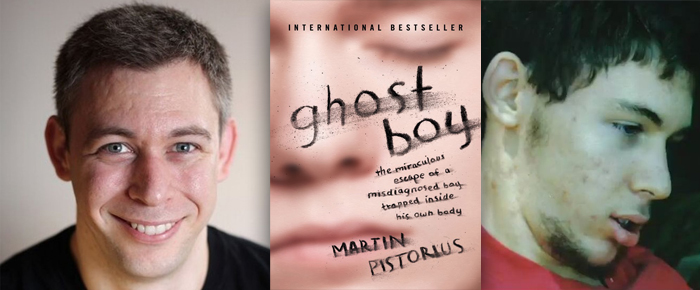
By Heidi Simmons
—–
Ghost Boy
by Martin Pistorius
Memoir
—–
Take a moment and imagine a life where you could not communicate a word or move a limb. How would it feel if everyone, including your family, only sees you as a vegetable? In Martin Pistorius’ memoir, Ghost Boy: The Miraculous Escape of a Misdiagnosed Boy Trapped Inside His Own Body, the author shares the horror and the triumph of being human.
When Martin Pistorius was 12, he came home from school with a sore throat. He never went back because everyday he became sicker and sicker until he lost the use of his voice, limbs and mind.
Without a known cause (and never diagnosed), the young Pitorius lost his ability to speak and became a quadriplegic bound to a wheelchair. Doctors did not expect him to live. He stared into space, drooling and needing full-time care. His mother declined to care for him. After a suicide attempt, Doctors recommended she focus on her two healthy children.
On his 16th birthday, Pistorius “woke up.” That is, he suddenly became self-aware. He heard voices talk about shaving his face and he saw a birthday cake. For years it was like he was in a dreamless sleep, he didn’t know a thing. But now that he was awake, it was a living nightmare. He still couldn’t talk or move.
Over the next four years, Pistorius, slumped in a wheelchair, observed the world. Unable to move his head or twitch a finger, he sat for hours, trapped and completely dependent.
From the get go, Pistorius’ father refused to commit his son and became his caretaker at home. His father got up early every morning, bathed, dressed and fed his son. He dropped Martin off at a day care facility on his way to work and picked him up on his way home. Where he again, fed, bathed and put his son to bed — a routine that would continue for two decades.
Unable to see a clock, Pistorius learned to tell time by the way the sun moved across the floor. It was torture. A television blared cartoons. Younger children in the facility wailed.
Everyone thought Pistorius was incapable of thought and comprehension. He became a silent witness to the personal lives of those around him. He heard his parents argue about how his life was hurting the family. He listened to people as they talked and gossiped with one another. People said awful things to him. He was routinely abused physically and sexually. He could do and say nothing.
When a new physical therapist arrived, she spoke to Pistorius as if he were actually listening. She made eye contact and asked how he was doing. She believed that Pistorius understood what she was saying and argued that he should be tested, although Pistorius was unresponsive.
Inside his shell of a body, Pistorius hoped to find a way out of his prison. His parents agreed to the tests. By moving his eyes across a board, Pistorius showed he could communicate and understood what was asked of him.
It took two more years before he was able to get a device that allowed him to communicate his wants and needs. His family bought him a computer with software that could be used to speak for him – a system called Augmentative and Alternative Communication. He became an expert with the software. He found that he loved computers. And he found a voice.
Pistorius got a job at his care facility debugging computers. The center that tested him, hired him to help evaluate patients and work on websites. He was given a motorized wheelchair. He became stronger, soon able to hold his head up and control his arms.
As an observer, Pistorius was mystified by human behavior. People could be so bad and yet they could be so good. He witnessed moments of love and he knew it was something he wanted. But he believed he was unlovable and repulsive. Then he met Joanna, a friend of his sister’s, on the Internet.
They fell in love. Pistorius was afraid and worried she would change her mind when they met in person. But Joanna assured him she was in love with him and that he was a “good man.” No one had ever said that to him. No one had ever called him a man.
Pistorius and Joanna married. Today, the beautiful couple live in London where they both work! He remains bound to a wheelchair and can only talk with his computer app.
This is an incredible memoir! Pistorius tells his personal story in short, often poetic, chapters. There are moments where the emotion is so intense it brings a lump in the throat and tears to the eyes.
The acts of human kindness are beautiful. And the abuse is horrifying. Pistorius says that he encountered far more good people than bad, but the bad is so bad you want revenge. The author never says if he reported the evildoers.
The most powerful element of this memoir is seeing reality through Pistorius’ eyes. He brings a consciousness and awareness about the world as only someone trapped in his own body can do. He includes moments of great insight and beauty. Pistorius also shows the reader firsthand what it feels like to be invisible. Even worse, he shares how it feels to be treated as if you are not human and don’t feel pain.
Ghost Boy should be required reading for caregivers and high schoolers. Pistorius delivers a potent narrative about what it means to be human: respected, loved, free, independent and compassionate to all living things.








































